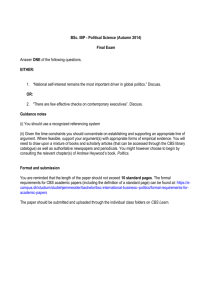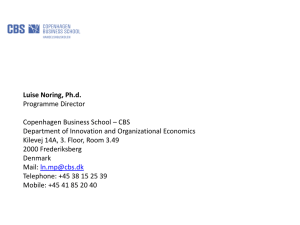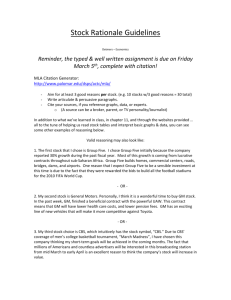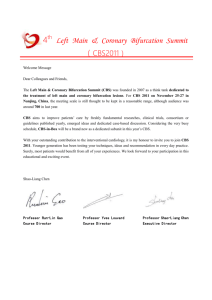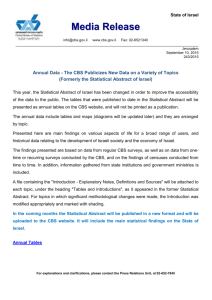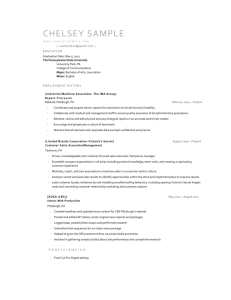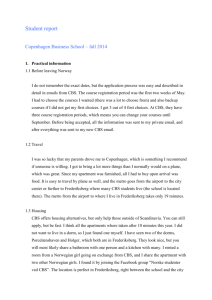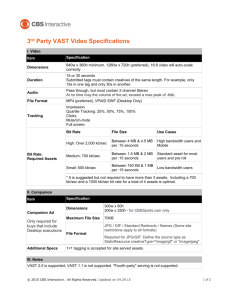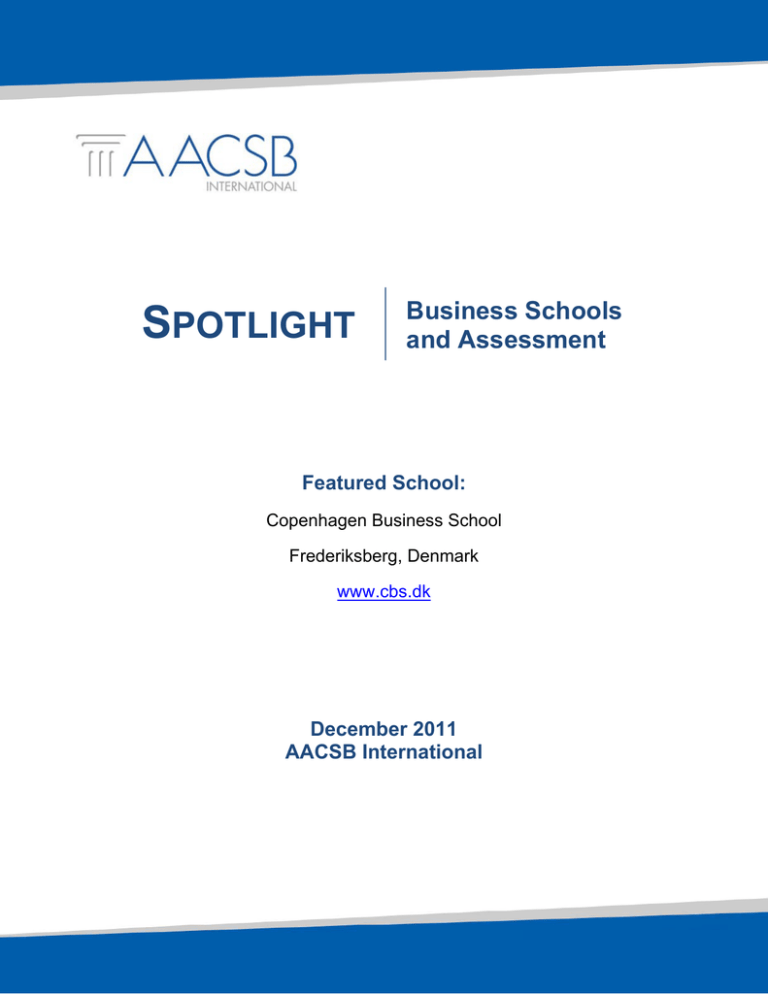
SPOTLIGHT
Business Schools
and Assessment
Featured School:
Copenhagen Business School
Frederiksberg, Denmark
www.cbs.dk
December 2011
AACSB International
SPOTLIGHT | Business Schools & Assessment
Copenhagen Business School | 2
Copenhagen Business School
The Copenhagen Business School (CBS) is the first business school in the nation of Denmark to achieve
AACSB accreditation. It is also one of the largest business schools to hold membership in AACSB
International, both in terms of faculty strength and student enrollment. Ole Stenvinkel Nilsson, CBS’
Director of Accreditation and Quality Assurance, oversees the efforts required for assessing the quality of
the business education received by over 18,000 CBS students at all levels (undergraduate, master’s, and
doctoral).
AACSB Senior Research Associate Colin Nelson recently discussed with Director Nilsson the means by
which his school is able to ensure the quality of the education it provides to so many students. One of the
more intriguing and unique aspects of assurance of learning at CBS is the significant level of ownership
that all its stakeholders have in the process, including administrators, faculty, students, and even alumni.
R. Colin Nelson (RCN): I understand that Danish law requires universities to have an assurance of
learning process similar to that required by AACSB of our accredited schools. Do you find that process to
be synergistic with the assessment efforts you undertake for AACSB?
Ole Stenvinkel Nilsson (OSN): There is obvious synergy between the statutory systems and AACSB.
The problem is, however, that assurance of learning systems tend to require quite specific data and
process definitions, and it is difficult to establish internal procedures and systems that meet the
requirements of both.
According to the “Order on the Accreditation Institution,” all Danish University Programs must pass a
national accreditation once every five years. The Danish Accreditation Institution, ACE Denmark,
established 2007, is an independent governmental institution overseeing that all programs are meeting
the Danish Accreditation Criteria,1 which are the following:
Criterion 1: Societal need for the program
Criterion 2: Labor market for the graduates
Criterion 3: Research basis of the program
Criterion 4: Program is based on an active research environment
Criterion 5: Quality and strength of the research environment of the program
Criterion 6: Educational structure of the program
Criterion 7: Organization of the learning process and the qualifications of the teachers
Criterion 8: Quality assurance process of the program
Criterion 9: The scholarly competence profile of the program
© AACSB International. All Rights Reserved.
SPOTLIGHT | Business Schools & Assessment
Copenhagen Business School | 3
Criterion 10: Learning goals and assessment of learning outcomes
As you can see, there is synergy between AACSB’s standards and ACE Denmark Criteria. The fact that
CBS has been involved in evaluations and accreditations since the 1990s has helped in creating
awareness and acceptance among faculty for this kind of quality assurance.
RCN: Perhaps you could give us some background information on the Danish system to help clarify how
that is so?
OSN: Certainly. Degree programs offered by Danish universities are regulated by a comprehensive set of
national regulations.2 Complying with these regulations is a necessary condition for being licensed to offer
the program. All degree programs must have a legal document, entitled “Program Regulations;” comply
with the Danish Qualification Framework; comply with the Danish Exam Regulations; be graded
according to the Danish Grading Regulations; comply with the Danish Government Examiner (“Censor”)
Regulations; and meet the standards of the ACE Denmark.
In addition to the program-specific requirements, Danish universities must have a Board-approved
strategy for the overall institution, deliver an Annual Report, and have a “Development Contract” (with the
Ministry of Science, Technology, and Innovation) identifying key performance indicators and overall goals
to be attained during the contract period.
Finally, the Danish University Act of 2003 specifies in detail how management of programs must be
organized, including processes for continuous improvement and engagement with external stakeholders.
In particular the University Act specifies the extent of student and faculty influence on program
development.
RCN: It’s interesting that you mention student influence on program development. One of the practices
that CBS has shared in AACSB’s Effective Practices Survey3 is the use of “Study Boards,” which include
an even number of faculty and students, to help in the continuous improvement process of each course.
Can you elaborate on how these Study Boards function in practice?
OSN: Study Boards are statutory by Danish law. Each program must have one (although it is possible to
share it with other programs). They typically have 6-10 elected members, and there must be a parity of
students and instructors. Each program must have a set of regulations, covering the subjects taught in
the program, their sequence and length, examinations required, flexibility allowed, etc. The Study Board
suggests a set of regulations to be approved by the Dean, and then decides on all academic matters
related to those regulations. CBS has chosen that each [degree] program has its own individual Study
© AACSB International. All Rights Reserved.
SPOTLIGHT | Business Schools & Assessment
Copenhagen Business School | 4
Board, and that each course [i.e., class within a program] has a course coordinator appointed from
faculty.
The Study Boards meet 4-5 times a year, and meetings must adhere to the “Standard Rules of Procedure
of the Study Boards at Copenhagen Business School,” including guidelines for notice of meetings, rules
of procedure, presentation of matters for discussion and decision, voting, committees, and minutes of the
meetings. In an annual report to the Dean of Education, each Program Director must report on major
challenges, and explain how the Study Board has chosen to react to such challenges in order to improve
the situation. In addition, Program Directors are expected to report on any new information that may lead
to program improvement opportunities in the future.
RCN: How did CBS come to develop this assurance of learning system?
OSN: The Danish national system for defining learning outcomes and controlling the exam standards is
the basis for CBS’ assurance of learning system. The historical basis for the current system is a longlasting focus (since the mid-nineties) on quality and assessment, starting with an international audit in
1996, a follow-up audit in 1998, and EQUIS accreditation in 2000. In addition, CBS has participated in
regular benchmarks since 2001, as well as international research evaluations for the last 15 years. All
these activities have developed a quality and assessment culture at CBS that makes it natural for faculty
to participate in assessments as part of continuous program development.
RCN: Can you give us a brief overview of the process?
OSN: Each year, several sources of information on performance and goal attainment are collected from
various sources—students, recruiters, teachers, censors, program managers and administrators, and
CBS Business Intelligence4—continuously throughout the year. This information is then processed at
regular meetings in the Study Boards, and decisions and new initiatives to improve program quality are
made accordingly. A summary of program assessments and planned development initiatives is presented
in the Annual Program Report (written by the Program Director) to the Dean of Education. After the
Dean’s approval, decisions are implemented in the Program Regulations for the following year. This
annual cycle constitutes the continuous improvement process of all degree programs at CBS. Everything
is regulated by general institutional strategies and policies.
RCN: Are there any significant variations in your assurance of learning practices, depending on program
or degree level?
© AACSB International. All Rights Reserved.
SPOTLIGHT | Business Schools & Assessment
Copenhagen Business School | 5
OSN: Very limited variations, as the whole process is standard. Since CBS has a large number of
programs, we have chosen the same assurance of learning model for all programs. In addition to the
national Danish framework for assurance of learning, CBS has institutionalized a number of internal
policies and standards to be applied to all its degree programs. The CBS Program Quality Policy includes
four strategies:
1. The Quality Assurance Strategy describes policies and procedures for quality assurance,
approval and regular assessment of programs and degrees, assessment of students, and sets
standards for teaching resources and student support.
2. The Knowledge Sharing Strategy describes how program information is shared and used as
basis for program adjustment and stakeholder feedback.
3. The Evaluation Strategy sets institutional guidelines for collecting, disseminating, and follow-up
on student survey data.
4. The Learning Strategy makes it clear to the students (and teachers!) what expectations CBS has
with regard to the students’ active cooperation in the learning process, and specifies the
educational ideal that all CBS graduates must adhere to. In addition, the Learning Strategy
contains regulations to ensure that teachers all have documented skills in university level
teaching and that proper support is given if needed. In order to get a tenured position at CBS, the
applicant must document that he/she has successfully completed a comprehensive CBS course
in university pedagogy, or has pedagogical qualifications at similar level.
Together, these strategies define the general framework for quality assurance and program management
of all CBS programs.
RCN: How has the use of the Study Boards impacted the learning goals of programs at CBS?
OSN: Course learning objectives are suggested by professors, and then approved by the Study Boards.
The Study Board then defines the program learning goals and writes them into the Program Regulations.
The Dean, in overseeing the process, is responsible for aligning program learning goals with institutional
learning goals.
RCN: How much relative weight do you give to feedback from current students, faculty, and graduates
when “closing the loop?”
OSN: All evaluations and feedback are discussed by the Study Board, where faculty and students in this
way close the loop when the Board annually adjusts the program regulations. Graduates/alumni have a
© AACSB International. All Rights Reserved.
SPOTLIGHT | Business Schools & Assessment
Copenhagen Business School | 6
less direct role. They are invited into advisory boards that receive summary reports on feedback and
program adjustments.
Our dialogue with graduates and employers is a difficult balance between specifics – the choice of
learning methods and subject elements, the distribution between different subjects, etc. – and general
issues like the choice of programs to offer, size of programs, etc. Advisory Boards provide useful
feedback on the general issues, but the transformation of that into course plans and instruction
technology is a complicated process, to which there seems to be no one good solution.
Exams are another source of feedback: grading in exams must follow learning objectives, and if grades
are weak, learning objectives may not be fulfilled. Study Boards receive grade statistics for all courses.
Those courses that have external examiners receive reports from the examiners that reflect on problems
encountered during exams.
RCN: Can you give us an example of an instance in which student feedback is vital to “closing the loop?”
OSN: Student feedback and reaction to it happens virtually every day, or at least every week. CBS has
about 30 Study Boards that receive student survey feedback twice a year. Two processes are typical:
instances where students express dissatisfaction with a certain instructor, who is then approached by the
course coordinator, Head of Department, or Program Director to discuss possible improvements. Or the
criticism is of a certain course or course element, where the same procedure takes place. Results from
those discussions are reported to the Study Board, where decisions are then made, if appropriate.
As far as specific examples, in 2003, the Full-time MBA introduced a formal rubric to assess the strategy
project, which is the capstone project of the MBA. The assessment demonstrated that students did not
sufficiently meet the learning goal to develop realistic implementation plans to meet practical obstacles.
As a result of this finding, a new mentoring scheme was introduced where students are teamed up with a
“grey wolf” and a “young lion,” two experienced leaders at different stages in their career, to coach the
students on leadership, including overcoming organizational resistance.
RCN: I see on the CBS website5 that students give survey feedback both on individual courses and on
their entire academic year. Does every student give feedback on each, or is there a sampling procedure
you follow?
OSN: Our surveys go out to all students in both cases, and the response rate on student surveys is
between 20 and 60 percent. One of the most important sources of information is course feedback from
students. In order to maintain a close follow-up on program delivery, CBS has implemented a standard
© AACSB International. All Rights Reserved.
SPOTLIGHT | Business Schools & Assessment
Copenhagen Business School | 7
evaluation policy: “CBS Evaluation Strategy.” The strategy consists of several elements: On-line surveys
of students' perceived quality of each course on a number of dimensions are mandatory. The
standardized questionnaires ask essentially the same general questions, regardless of the specific
degree program or course in question. The aim of this type of evaluation is to get comparable feedback
on a range of variables. Students are asked for their assessment of:
the course as a whole
the student workload
the extent to which students engage in course-related activities
the course content, curriculum, pedagogy, and teaching material
the students’ own contribution to the learning environment
the rating of teachers
This type of feedback is very useful to teaching staff as well as course coordinators, who report to the
Study Board on the results of the evaluations and make adjustments to content and pedagogy
accordingly. Based on the results of the student evaluations, the teachers at the particular program
engage in discussions as a natural follow-up to the students’ evaluation. However, the discussion among
the teachers is not restricted to the results of the students’ evaluation, but also includes more
fundamental discussions concerning the overall goals of the degree program. Thus, the student survey
report is an opportunity to make an annual overview of the program. This discussion process is believed
to be a very crucial element in the ongoing development of both the content and structure of the degree
programs.
Based on the student surveys, the Study Boards give feedback to the course coordinators, individual
teachers, and Heads of Department, and also initiate measures in response to survey results. In cases of
repeated poor performance, the Study Board may demand that the teacher in question be replaced. More
positive reactions include formal letters of recognition and prizes of teaching excellence.
RCN: That sounds like a lot of data to collect and process. Do you have anyone (i.e., staff, graduate
assistants, etc.) that aids you in collecting and analyzing the data?
OSN: In fact, the overall responsibility for the program quality lies with the Dean of Education, next with
the Program Director, and then the Study Board. My role is mainly to observe and respond if I observe
results or processes that are not in accordance with the general standards, but I don’t have the
operational responsibility. Data on program performance is collected by CBS Business Intelligence, a unit
at our school dedicated to collecting and presenting data on all [Key Performance Indicators] KPIs,
including program performance.
RCN: Is there a budget allocation process for all the assessment processes at CBS?
© AACSB International. All Rights Reserved.
SPOTLIGHT | Business Schools & Assessment
Copenhagen Business School | 8
OSN: Each program receives a budget that must cover all instruction and assessment, including external
examiners. The budget is allocated on a set of parameters including level, size and discipline. The
Program Director allocates funds (including monetarized drawing rights on professors’ time) among
courses. The survey system has its own budget allocated from the central CBS administration. It is highly
automated, and therefore relatively cost efficient.
Acknowledgements: AACSB International is grateful for the input and assistance of Ole Stenvinkel
Nilsson, Director of Accreditation and Quality Assurance at Copenhagen Business School.
© AACSB International. All Rights Reserved.
SPOTLIGHT | Business Schools & Assessment
Copenhagen Business School | 9
End Notes
1
ACE Denmark. (2008) Translation from ACE Guide to Accreditation of Existing University Programs, April 2008. Copenhagen Business School. (2010) Act on Transparency web page. Electronic document, http://www.cbs.dk/en/About‐CBS‐Campus/Quality/Act‐on‐Transparency, accessed November 11, 2011. 3
AACSB International. (2011) Effective Practices Survey 2010‐11, DataDirect data. Electronic document, http://www.aacsb.edu/datadirect/, accessed November 8, 2011. 4
Copenhagen Business School. (2011) Business Intelligence & Development web page. Electronic document, http://www.cbs.dk/Om‐CBS‐Campus/Organisation/Business‐Intelligence‐Development/Business‐Intelligence‐
Development/(language)/dan‐DK, accessed November 11, 2011. 5
Copenhagen Business School. (2011) Evaluation policy web page. Electronic document, http://www.cbs.dk/en/About‐CBS‐Campus/Quality/Evaluation‐of‐Education/Evaluation‐policy/Evaluation‐policy, accessed October 31, 2011. 2
© AACSB International. All Rights Reserved.

